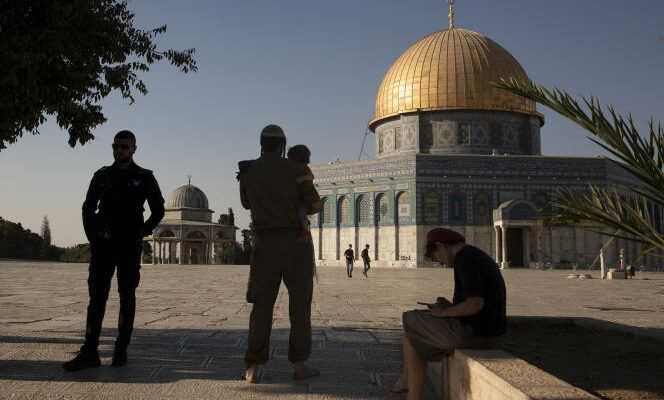In an electric blue suit and moccasins, Azzam Al-Khatib hops on the marble cobblestones of the path which ascends to the immense golden cupola of the Dome of the Rock, on the esplanade of the mosques in Jerusalem. The director of the Waqf, the Muslim religious foundation which administers the holy places, pokes his head under the olive branches almost ready for the harvest. He is worried. This Monday, October 18, surrounded by guards, he follows with his eyes a group of Jewish faithful who finish their morning prayers.
Since the end of September, Mr. Al-Khatib has been loudly denouncing these regroupings. In a statement circulated widely across Palestine, he lamented the increase in incursions by Jewish militant worshipers into Islam’s third holiest site. The official accuses the Israeli police, who supervise and protect them, of transforming the enclosure of Al-Aqsa (called by the Jews the Temple Mount, in reference to the two temples, that of Solomon and that of Herod, which were erected in Jewish tradition at this location) in “A military barracks”. By the way, the director recalls that Al-Aqsa “Is a mosque for Muslims and cannot be divided or shared”.
Mr. Al Khatib’s indignation is the fruit of years of more discreet ruminations. Radicals have long been trying to break the “status quo”, the unwritten rulebook forged after Israel’s conquest of the Old City of Jerusalem in 1967, which stipulates that non-Muslims have the right to visit the city. Temple Mount, the holiest place in Judaism, but without praying there. Their efforts, supported by the Israeli authorities, are starting to pay off.
Sorting visitors
According to Ofer Zalzberg, of the Kelman Institute for Conflict Transformation, the Israeli police chose to allow their prayers as early as 2016, under the government of Benjamin Netanyahu, without giving them too much publicity. Gradually, the system has broken down. Today, the ritual is almost daily, open, visible. This situation is flammable.
“Jewish extremists are trying to change the situation on the ground, and it has only gotten worse under the new Israeli government” Najih Bkirat, number two of the Waqf
In the past decade, it was in Al-Aqsa that all major Palestinian uprisings were born. Notably the one that caused the last war in Gaza, in May. “Jewish extremists are trying to change the situation on the ground, and it has only gotten worse under the new Israeli government, [dirigé par Naftali Bennett et mis en place en juin]. It’s a barrel of powder ready to explode ”, says Waqf number two, Najih Bkirat.
You have 70.45% of this article to read. The rest is for subscribers only.
